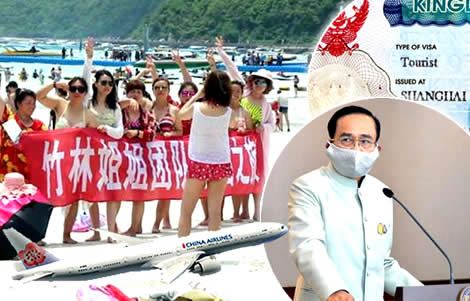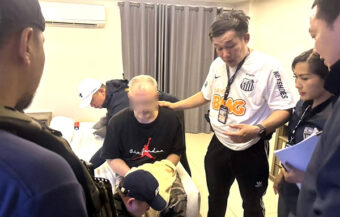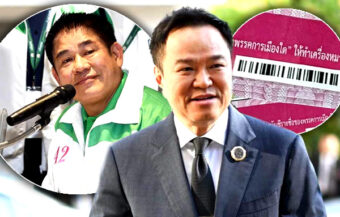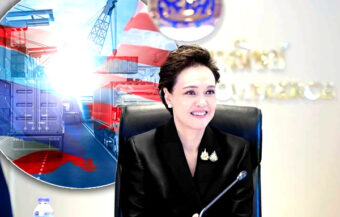Very little progress in reopening Thailand to tourism despite the fanfare surrounding new initiatives. As Thailand extended its State of Emergency this week until October 31st, it is clear that the country is still in defensive mode against the Covid 19 virus no matter what the cost may be. Indeed, this should not come as a surprise. It has been the consistent message of the Thai Prime Minister, Prayut Chan ocha, since the emergency was declared at the end of March.
120 foreign tourists from China will arrive in Phuket on October 8th next representing the first foreign tourists in Thailand since it effectively closed down its foreign tourism industry in April with a projected loss of up to ฿8 billion a day. Despite an endless series of announcements and consultations, it also appears that the country is not set to reopen itself to foreign tourism, in any meaningful way, in the foreseeable future as it maintains its defensive posture against the virus at all costs.

Thailand will not be opening its borders to foreign tourism for quite a while yet. That was the message from Thai Prime Minister, Prayut Chan ocha, this week even as he confirmed that the first tourists to arrive in Thailand since the country closed its borders in April this year, will be 120 visitors from China who are scheduled to arrive in Phuket on October 8th next.
‘We are not opening the country, we are limiting the number of entries and will manage with wrist bands, apps to follow them,’ the PM told reporters referring to a tracking app that has been developed by the Ministry of the Digital Economy and will be used by all visiting tourists arriving on the new Special Tourist Visa.
Special Tourist Visa is the only approved measure that is being implemented, at this point, to restart tourism
The Special Tourist Visa is the only measure that has been agreed by the government to date to facilitate Thailand’s reopening to tourism.
Despite the hype and publicity surrounding it, it comes with demanding conditions and is highly restricted in its availability.
The 90-day visa itself, however, once the holder has arrived in Thailand can be extended twice at a fee giving a total maximum possible stay of 9 months in the kingdom.
The visa, presently, can only be applied for from a limited number of countries with a proven track record in fighting the coronavirus.
It can only be issued through the world network of Royal Thai Embassies and consulates or the Thailand Longstay Company, a commercial entity operated by Thai tourism authorities to facilitate the new visa which as things currently stand, represents the only way that tourists can access Thailand.
Access to the country with the visa is also limited to government-managed chartered flights from locations throughout the world.
Approved by the cabinet in September and only given final, conditional approval by the Centre for Covid 19 Situation Administration (CCSA) this week
The visa was approved by the Thai cabinet in mid-September but more importantly, only received the critical assent of the Centre of Covid 19 Situation Administration on Monday. This entity has emerged as the most powerful body in Thailand during the Covid crisis and is chaired by the Prime Minister, Prayut Chan ocha.
Since the Covid 19 crisis erupted, the prime minister has stayed true to his commitment, given at the outset, to place public health ahead of all other considerations and this has not changed despite renewed efforts by economic ministers and the establishment of a Centre for Economic Situation Administration at the end of August.
The new visa comes with a requirement for a Covid 19 negative test within 72 hours of departure to Thailand, ample and certified health cover and a mandatory 14 day stay within Thailand’s Alternative State Quarantine scheme.
This is a network of luxury hotels working in partnership with the Ministry of Public Health. During the 14 day stay, tourists are tested twice.
Alternative State Quarantine Scheme has limited capacity due to lack of medical screening facilities
The system has limited processing capacity and is not geared towards the return of anything like the free mass-market tourism that existed in Thailand before March 2020, in the distant future.
A key limitation is the lack of medical resources including testing to allow for scalable expansion of the Alternative Quarantine Scheme which has proved effective.
The current Minister of Tourism and Sports, Phiphat Ratchakitprakarn, has suggested that the quarantine period may be reduced from 14 days to 7 days.
This is based on international experience where some countries require Covid 19 tests at airports both before and after flying and have found this system, in addition to 5 days quarantine, to be more effective at screening then a 14-day quarantine period.
However, the proposal has already drawn strong warnings from Thailand’s medical establishment who are advocating that the government resists and put aside all hopes of resurrecting the lucrative foreign tourism industry until the virus threat has been brought to an end outside Thailand’s borders.
They are warning that the kingdom faces a real threat of a far more virulent outbreak than that seen earlier in the year and to date.
Thailand has only experienced just over 3,600 cases of infection and 59 deaths despite it being the first country to report a case of infection outside China earlier this year when the virus first emerged in Wuhan.
New Special Visa holders expected to spend 1,700% more than the average 2019 visitor
On Tuesday, government spokesperson Traisulee Traisoranakul told reporters that the kingdom was expecting just over 1,200 visitors per month under the new Special Tourist Visa regime and that this will help generate ฿1 billion per month in income.
That is ฿833,000 per visitor and compares to an average spend of ฿49,500 per tourist visitor in 2019. Obviously, the new Special Tourist Visa holders are high spending individuals.
That’s an expenditure hike per person of 1,700%.
Even if so, the new tourist visa will still only represent 0.72% of lost foreign tourism income
However, the projected income will still be far short of the ฿5.28 billion a day that foreign tourists alone spent last year.
Economic analysts have also speculated that the knock-on effect of the absence of these tourists is an overall loss of ฿8 billion per day to the economy as the tourism industry in Thailand from both direct and indirect sources makes up closer to 20% of the economy rather than the 11.9% shown by technical measurements or data.
This daily loss is in addition to the 65% drop that Thailand has also seen in what was termed the domestic tourist market this year despite generous government incentives meaning Thailand is losing ฿7 billion per day in direct lost tourism expenditure at this time.
The upshot is that the foreign tourism industry still stands to lose 99.28% of its income from now and into 2021 unless there is broader access to foreign tourism.
World Bank warns that economic contraction in 2020 could be 10.4% and of poverty in the tourism sector
The Thai economy according to the World Bank is expected to contract sharply by 8.5% in 2020 although the Bank of Thailand has recently scaled this level of contraction back to 7.8% based on signs of reduced export contraction and with promises of retargeted government stimulus measures.
The World Bank noted in its report this week that the extensive stimulus measures announced by Thailand for 2020 did not seem to translate into the real economy.
‘Despite Thailand handling the virus outbreak well and implementing a stimulus package making up 8 to 13% of GDP, some stimulus measures, such as the ฿3,000 handouts per person, were not directed to the targeted segment and the government should find a method to distribute money to reach households more efficiently,’ Birgit Hansl, the World Bank’s point person for Thailand explained.
The bank warned that the final outcome for Thailand could be an economic contraction as high as 10.4% and particularly referenced poverty in the sectors of the economy which were highly dependent on tourism.
Civil Aviation Authority confirms the government’s defensive posture with state of emergency extended
In the meantime, the Civil Aviation Authority has confirmed that the draconian restrictions on incoming passengers and air flights are being tweaked with the now limited exceptions approved by the Centre of Covid 19 Situation Administration.
Despite this, Thailand’s borders effectively remain closed to foreigners and tourists except under narrowly defined grounds for which approved access is required on an individual basis and in a process that is time-consuming and tortuous.
A manager of the authority, Klot Senalak, on Tuesday also made it clear that officials would be meticulous in ensuring that incoming passengers possessed the proper paperwork without which entry to the kingdom will not be allowed.
This includes medical certification, health insurance certification and an official certificate of entry into Thailand.
Thailand, also this week, extended its state of emergency until October 31st as the country maintains its defensive posture against the virus no matter what the cost may be.
Get all our latest stories, follow Thai Examiner on Facebook here
Further reading:
Time up for some long-stay business owners as immigration warns of arrests after Saturday’s deadline
Two Immigration Bureau officers in Nonthaburi suspended after video appears to show bribe request
Stranded foreigners must get embassy letter, new visa or leave Thailand to avoid arrest by police
US Embassy in Bangkok – guidance on the visa amnesty expiry
UK Embassy in Bangkok – letters for visa extensions
PM signs order granting visa extensions to all valid visa holders until April 30th to cull queues
Smart cars highlighted by the Immigration Bureau as it seeks out foreigners hiding from the law
Immigration boss warns that a new crackdown on foreigners flouting Thai laws has begun


















